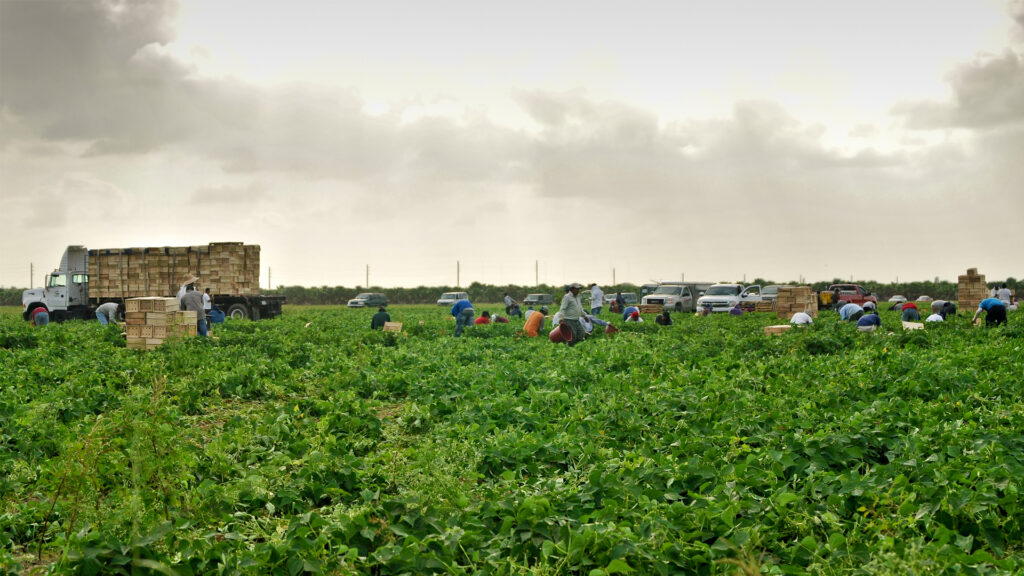By Chelsea Rivera, Central Florida Jobs with Justice
The first day on the job is usually accompanied by anxiety about job performance and concern about first impressions. What’s not typically at the top of one’s first-day-of-work worry list is death, but for outdoor workers in Florida, this is the grim reality.
On Jan. 1, a young agricultural worker in Parkland died on his first day of work due to extreme heat exposure, a death that the Occupational Safety and Health Administration deemed preventable if his employer had provided basic heat protections.
On July 5, yet another farmworker died as a result of extreme heat, demonstrating that heat-related injuries and deaths are an urgent and growing problem in Florida. Protections should be enacted at the local, state and federal level to protect workers and provide them with safe, dignified and healthy workplaces.

The number of extreme heat days in Florida continues to grow. From 1971 to 2000, one could expect around 25 days of extreme heat days (heat index values of over 100 degrees), but within the next 10 years, that number will grow to around 125 days per year. Miami, in particular, is expected to have the highest increase of dangerously high heat of any county in the U.S. by mid-century. With 23% of Florida workers classified as outdoor workers, we need to enact protections that respond to our grim climate reality.
Central Florida Jobs with Justice conducted a heat research project in Central Florida to better understand the experience of heat that is unique to workers in this region. Through 34 in-depth interviews with workers across six sectors, our organization developed a better understanding of best practices for heat protection as articulated by people who have direct experience with this heat.
Key findings, which are outlined below, are consistent with research on best practices for heat-illness protections:
- Nearly 30% of respondents lacked appropriate water: Best practices dictate that workers have access to 32 ounces of employer-provided, cool, potable water per hour of outdoor work.
- Forty-four percent of interviewees lacked appropriate rest breaks: Recommendations for breaks are 10-15 minutes every two hours, plus a lunch break.
- Fifty percent of respondents reported inadequate access to shade: Shade should be easily accessible, well-ventilated and large enough to accommodate all workers taking a break at one time
- Two-thirds of interviewees reported that they did not receive any heat-related training: At minimum, training should include risk factors, acclimatization, signs and symptoms, and basic first aid, as well as employees’ rights and employers’ responsibilities.
A growing body of research supports the need for heat-related protections for workers, yet only four states currently have heat protection legislation for outdoor workers. Florida, despite having an average high temperature of 93.5 F this past July, does not have a single piece of legislation protecting outdoor workers. However, organizations such as We Count! and the Florida Immigrant Coalition are working to pass local legislation in Miami to protect Florida’s workers.
We Count!’s Que Calor campaign is a worker-led campaign that champions protections for hundreds of thousands of outdoor workers in Florida who must work in the heat without any federal, state or local protections. This group was behind the Heat Standard for Outdoor Workers legislation that was introduced at the Miami-Dade Commission this summer and passed in the community health committee this past Monday. It will be voted on by the full commission in October.

The legislation has three simple demands — heat, rest and shade — in order to protect our workers. If this legislation is passed in Miami-Dade, it would be the first county in the nation with this type of outdoor worker heat protection ordinance.
While some opponents of heat protection laws are concerned about the “economic burden” that such legislation could cost industries, a recent publication estimated that $10 billion are lost to heat-related productivity losses in Miami-Dade County. Surely whatever “economic burden” opponents are citing will not amount to $10 billion.
Profits aside, can we not demand protections for workers for the simple reason that they deserve respect? One farmworker commented: “We are human beings … The fact that we work under the sun, that we work hard, does not mean we are not human beings, that we don’t deserve respect.”
For all readers who believe in the sanctity of life, let me remind you that this also includes our farmworkers, our undocumented community members and all the folks who work outside to keep the Florida economy booming. We urge local, state and federal elected officials to protect our outdoor workers by passing comprehensive heat protection legislation.
Dr. Chelsea Rivera is a Climate Equity Policy Fellow at Central Florida Jobs with Justice, which is a coalition of labor unions, community-based organizations, faith-based and student groups coming together to build power for worker rights. For more information about their Heat Stress in the Workplace research, please visit www.cfjwj.org/HeatResearch.
If you are interested in submitting an opinion piece to The Invading Sea, email Editor Nathan Crabbe at ncrabbe@fau.edu. Sign up for The Invading Sea newsletter by visiting here.



